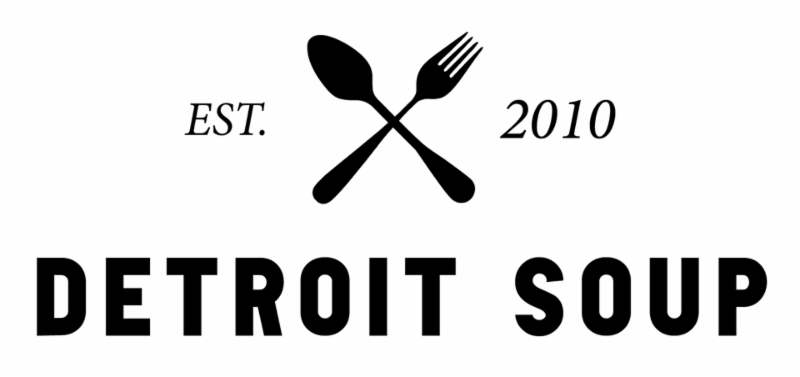Detroit Soup
Gallery

What can you get for five dollars? Well that depends on where you go. On Henry Ford College’s campus you'll be able to get something to eat and drink; if at a coffee shop, then probably one overpriced coffee. But did you know that you could get soup, bread, entertainment, artwork, and, above all, a vote in your community?
The Detroit Soup is an ongoing community event that started in 2010. This event promotes local musicians, local artists, local entrepreneurs, and soups. From hearty chicken noodle, to vegetarian or vegan, there is soup for everyone. The focus of Detroit Soup is encouraging people to pursue their passions. People drop their names in a hat to decide who will present their ideas, and those in attendance vote on the best idea, which will be awarded startup funding. Four presenters talk about their projects and the audience may ask up to four questions per presenter. After the questions, the audience discusses which project would help out the city the most and vote for whoever will get all the money that was collected at the event. Past winners include “Always Brewing Detroit,” a coffee house in the Grandmont-Rosedale neighborhood, “Rebel Nell,” a jewelry and accessory business that has turned graffiti art into fashion, and “Sit On It Detroit,” which provides benches at bus stops where people would normally have to stand to wait for the bus.
In 2013 Detroit Soup expanded to “Neighborhood Soups,” including Hamtramck. I had the opportunity to talk with the head of the Hamtramck Soup, Erik Mitchell.
How long have you been involved with Detroit Soup?
Mitchell: “I think it'd been three years now since out group started.”
How would you describe Detroit Soup to someone considering getting involved?
Mitchell: I'd describe it is it's a community event,.... it is about helping people fund projects, it's about the connections people make. To come together and figure out projects that are important……. and discussing what things should be happening in in the community.
What is the best part of your experience?
Mitchell: I really like seeing people talking to each other and I learn something new every time we do an event because there are so many people with different ideas …..But I really like seeing when we have people that come and their proposals win and they go on to build it.
Have you noticed any difference in the community since Detroit Soup began?
Mitchell: I think so; I think people are more connected…….. we've seen people that have met at events who are starting to talk about projects come together and collaborate which is really great.An example of this collaboration was when the Holy Cross Church, who does a monthly soup kitchen, didn't win that night but after somebody donated a fridge full of meat with the fridge for them to use for their soup kitchen.
Has this event inspired the neighborhood or the people?
Mitchell: I hope so, I'm coming from a biased perspective, it definitely makes me care more about my involvement with the city and I think the people that come also see that.
Do you have any memories that stuck out when you think of Detroit Soup?
Mitchell: ell, the story of the losing proposal that still got help, The Holy Cross Church’s soup kitchen.
The Detroit Soup has a democratic process, in your view, how does this affect the people?
Mitchell: We don't really have people feeling it's unfair and when we have had that, we changed our process a little bit but we want people to know that their voice is important…... I think that's really important to. Is giving people the power to vote for things that they care about…….. When you're in a group of people of ninety people that live in the same city and also care about the same things you do, then you know that vote is going to go a whole lot farther.
In your view, what could be done to get more people involved with this event?
Mitchell: We need a better way to get the word out about it and make people care about it before they get there. We've relied mostly on social media because that seems to work…...Every community needs something different to get something to want them to come and……. how do we bring the Yemeni community more readily and the language barrier is a part of that to. That we speak English, everything happens in English. for somebody who doesn't speak English, that's not necessarily something they want to be part of, which is a barrier for us and that's something we'd really like to overcome in some way.
One of the Detroit Soup’s mission is to change the way people interact with the democratic process. Have you noticed a change?
Mitchell: I think that people always respond to democratic process in the way they see that their vote counts and what they're doing counts and matters.
Where does Hamtramck Soup get its support or funding?
Mitchell “I say mostly just community support. It's hard to tie those things together because we've had 10 events. They're always benefitting the community
Why should college students be interested in this event?
Mitchell: To be a part of their community; I think that especially college students, don't necessarily feel like a part of the community, you're just going to college there, live there, but for somebody that doesn't necessarily have a community or doesn't have involvement within that community, it's a great way to do it. You meet people, you see art, you listen to music, you can talk about what you care about. Not to mention the other opportunities you might have there when you talk to someone who had a similar idea as you.
Detroit Soup has created a bond between the citizens that as well as inspiration to for people to turn their passions into businesses. For more information on upcoming “Soups,” visit: detroitsoup.com.
